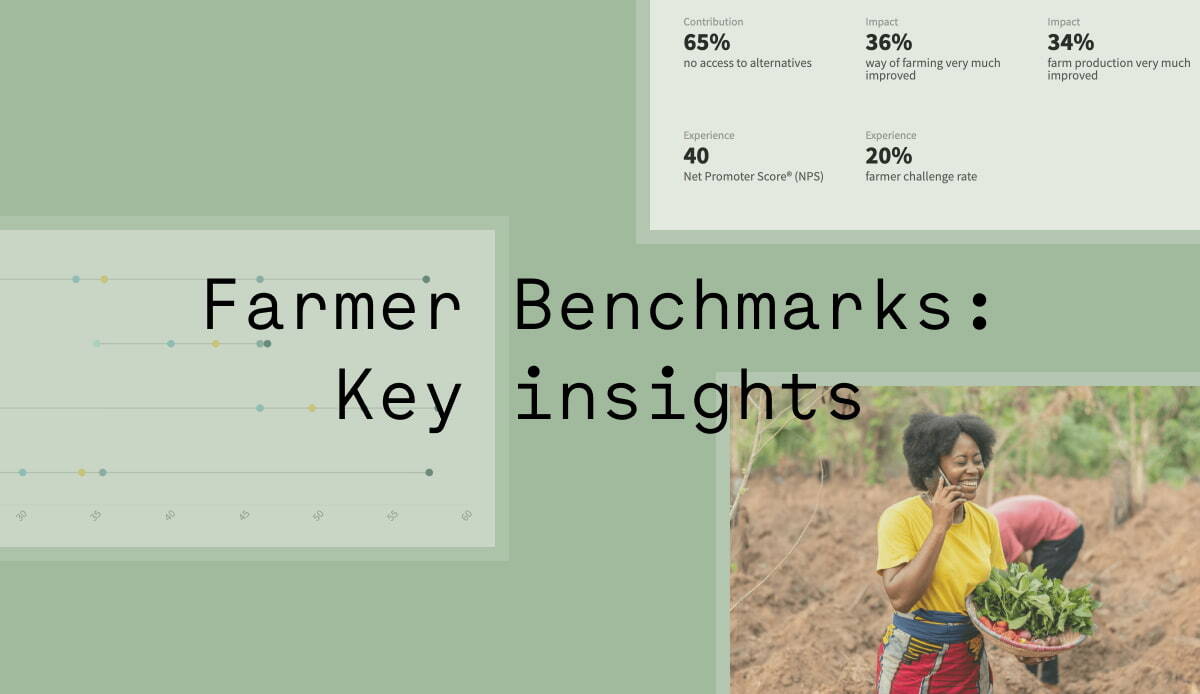
4 Things We’ve Learned from the 60dB Farmer Benchmarks
To help the agriculture sector better serve the farmers feeding the world, we’ve released the sector’s first farmer-powered performance benchmarks. Throughout 93 projects spanning three years, we at 60 Decibels have interviewed more than 18,000 farmers across 19 countries. Together, we can understand where we’re excelling and where we can do better. Read through our four takeaways from the 60dB Farmer Benchmarks.
Gender Parity: Farmers Are Thriving Together
Female farmers constitute more than half of the agricultural labor force in most countries, and women often face disadvantages: less access to land, credit, and markets. Our data shows that the women who are being reached by agribusinesses experience impacts similar to their male counterparts. Once women have access, they can take full advantage of the products and services offered by our clients.
This parity exists across our three key impact metrics for agriculture. The benchmark, or median, value for female farmers reporting significant enhancements in their farming practices is 41%, versus 40% for males. For production, the benchmark is 31% of female farmers reporting substantial increases, compared to 34% for males. Finally, the benchmark is 27% of female farmers reporting significantly higher earnings from their farms. This is just higher than the benchmark for males of 25%.
Our Lean Data studies are a key tool for elevating the voice of female farmers and reducing the extent to which decision-makers rely on male-biased data. Female farmers constitute nearly a third of the voices in our benchmarks, and we are striving to increase this. While we are pleased to see similar impacts across key metrics, we know that the lived experience of the female farmer is different, and we want to help companies both understand and tailor offerings around those differences.
Quality of Life Improvement Isn’t Just Related to Earnings
By segmenting companies by the service they provide, our benchmarks allow companies to compare their performance against others with similar models. Companies that provide inputs, equipment, or training have a positive impact on farmers’ way of farming (33-35%) and total farm production (33-36%). The benchmark value for impact on earnings is lower (26-27%), which we expected because earnings depend on multiple factors such as market access and prices.
However, we did not expect the benchmark value for improved quality of life (33-35%) to exceed the earnings benchmark. This tells us that inputs, equipment and training can do more for a farmer than simply help their bottom line. Improvements to quality of life go beyond financial gain. When describing these changes (in their own words), farmers report improvements around time spent, labor, stress reduction, or knowledge enhancement. These findings emphasize the importance of considering multidimensional impacts when evaluating the success of agricultural interventions.
Successfully Reaching the Underserved
Our data shows that companies are not just reaching well-connected farmers, but also delivering critical services and innovations to underserved populations. Most farmers we survey access a product or service for the first time, lacking access to alternatives. For instance, among companies providing information and advisory, the benchmark value for the portion of farmers who lack an alternative source of information is 82%. Additionally, approximately 80% of the 18,000 farmers we interviewed operate on four hectares of land or less, with two hectares being the benchmark average.
For all 60 Decibels projects, we calculate an ‘inclusivity ratio’ that represents how closely a company’s user base mirrors the national population in terms of wealth distribution. In agriculture, the benchmark is .82, which is close to the parity value of 1. (For comparison, the benchmark in microfinance is .60, which means MFIs generally reach wealthier households.)
Climate Resilience: Daunting Challenges Ahead
A staggering 84% of farmers have dealt with unexpected climate shocks in the past two years. This statistic highlights the urgent need to build resilience within the agricultural sector.
To tackle this pressing issue, 60 Decibels has developed a tool aimed at better understanding the impacts of climate shocks on farmers and wider communities. By deploying this survey module, farmers and other stakeholders can gain insights into climate-related challenges and develop strategies to mitigate risks. The tool will contribute to the collective efforts of building resilient agricultural systems and ensuring farmers’ sustainability in the face of unpredictable weather events. By next year, our farmer benchmarks will include key resilience impact metrics!
Embracing the Power of Benchmarks
These farmer benchmarks are just the beginning of our journey. By giving voice to farmers and incorporating their experiences into benchmarks, we aim to promote transparency, accountability, and informed decision-making in the agricultural sector. These benchmarks help contextualize progress and drive positive change. As we move forward, look for the launch of our digital agriculture index to better understand the larger impact of innovating tools and solutions for farmers around the world. Through these benchmarks, we strive to empower farmers, encourage collaboration, and foster a sustainable and inclusive agricultural ecosystem.